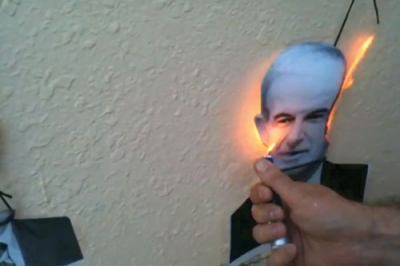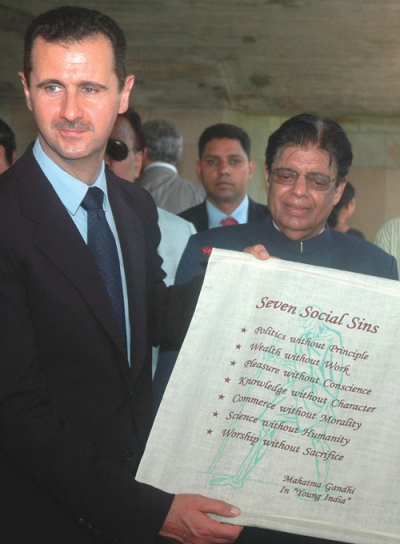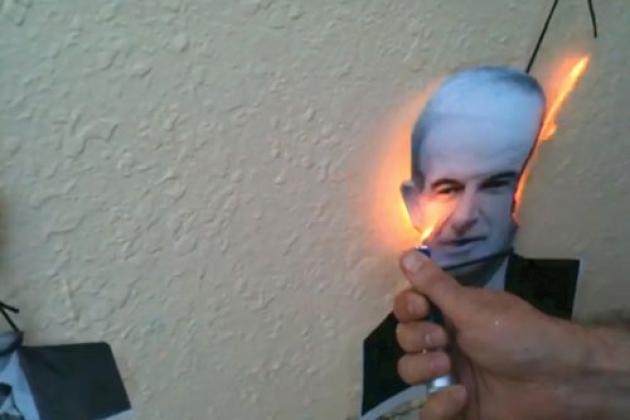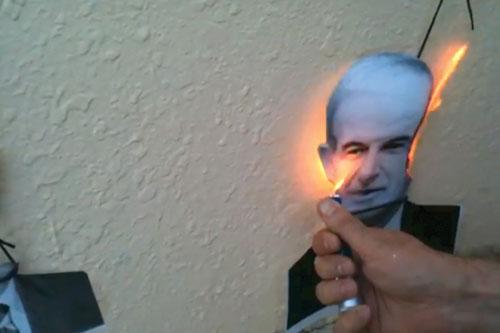The great North African historian Ibn Khaldun (1332–1406), wrote the above about dynasties in his Muqaddimah: An Introduction to History. Ibn Khaldun had written that prestige in one lineage lasts four generations before it dissipates. It is doubtful whether the Assad lineage in Syria is slated for four generations.
What mattered as a rebellion broke out in Syria in 2011 was the insight into the relation—the similarities, the difference in skills—between Hafez al-Assad and his son Bashar. The father had rigged the succession; fear had done the trick. The lieutenants in the wings, old subordinates and colleagues who had known the father and who had ideas of their own that his death would give them a shot at succession, were bullied and sidelined. There was Vice President Abdul Halim Khaddam, a lawyer from Baniyas and a Sunni who was two years younger than Hafez al-Assad, an ally from the very beginning of the Assad reign. There was Minister of Defense Mustafa Tlas, also a Sunni, from Rastan, near Homs. He had served in that position since 1972 and hailed from the officer class, unfailingly loyal to his leader. These and others had been pushed aside in favor of a newly minted “General” Bashar al-Assad, thirty-four years old when he inherited the realm. This was not the script the ruler had had in mind. He had groomed his oldest son, Basel, but that son had died in a traffic accident in 1994. The old guard had to submit to and accept this dynastic succession. Khaddam didn’t, and ended up making his way to exile and opposition from Paris. Hafez al-Assad didn’t have much time to tutor Bashar, and as Ibn Khaldun and countless others had told us, such skills are not easy to transmit.

A Syrian protester sets fire to one of the ubiquitous portraits of the late leader Hafez al-Assad last year. Videos such as this were spread around the world, thanks to YouTube and Twitter. The Assad dynasty was founded on the Alawis’ jumbled mix of persecution and superiority, but its estrangement from the Syrian mainstream made its survival unlikely.
“Yalla Erhal Ya Bashar” (“Come on Bashar, leave”), chanted the crowds. More poignantly, in Hama, the young people carried placards that read, “Like Father, Like Son.” Back when he had come into power, Bashar had made a good first impression, if only because he was different from his intimidating, stern father. His father had been a peasant boy, born in the Alawi mountains and married into his own community; he had come into the coastal city of Latakia, and he had plotted his way to the summit of political power. So many of Hafez al-Assad’s peers and rivals had fallen to assassins’ bullets or perished in Syria’s cruel prisons, dispatched there by Assad himself. In contrast, Bashar had been the entitled prince, schooled in the best academies in Damascus and with a stint in London behind him. He had known no hardship. In the manner of a society eager for deliverance, it was hoped that he would open up the big prison that Syria had become under his father.
Outsiders prophesied good tidings for Bashar. U.S. Secretary of State Madeleine Albright, who had gone to the old man’s funeral in 2000 and met the son, came back with a favorable report: he was a “reformer,” she said, bent on modernizing his country. French President Jacques Chirac took it upon himself to induct the young ruler into the respectable order of nations. Bashar married well, which was his first olive branch to his country. His wife was a Sunni, the London-born daughter of a cardiologist, Fawwaz al-Akhras, who lived in self-imposed exile in London and spoke discreetly of the sins of the old regime. The bride had worked for J. P. Morgan in London and was on her way to pursue a Harvard MBA when she met and then married Bashar. There was talk of a “Damascus spring” at the beginning of his reign.
Small gestures mattered. Bashar made his way to restaurants now and then without heavy security. He was head of the Syria Computer Society and promised openness in a country where the ownership of fax machines was restricted. Western cigarettes, banned by his father, were now available. There was a boom in tourism and a respectable flow of investments from the gulf states. Art galleries and five-star hotels changed the drab atmosphere. He released from captivity several hundred political prisoners, and his people could be forgiven the classic hope that if only the “good czar” knew, if only his palace guard would let him rule according to his wishes, the realm would be repaired and the oppression lifted. But the political universe had been closed up. Power had made a seamless transition—from the Baath Party to the Alawis, and then to the House of Assad—from the sect to the family. The young man who was said to thrill to the music of Phil Collins was cut of the old cloth. He, too, like his father, could brook no dissent.

Syrian President Bashar al-Assad, visiting India four years ago, holds a list of “Seven Social Sins” enumerated by Mohandas K. Gandhi. The younger Assad made a good impression on many people when he first rose to power, but he lost no time snuffing out the first “Damascus spring.”
THE PILLARS OF POWER
To rule Syria effectively, the man at the helm had to have mastery over the four pillars of political power: the Alawite community, the army, the security services, and the Baath Party. A renowned journalist and activist, Michel Kilo, would maintain as late as 2009 that Bashar dominated foreign policy while the security services reigned over domestic affairs. The true picture of the young ruler’s proclivities was not long in coming.
Syrians were thirsting for liberty. Long silenced, they yearned for political argument and debate, which had been so prominent a feature of their political life before the Assad years. A noted intellectual and academic living and teaching in Paris, Burhan Ghalioun, recalls the enthusiasm of that moment: civic forums sprouted everywhere, there were fifty new “salons” in the space of a few months, and even villages wanted forums of their own and were willing to run afoul of the security forces.
One such civic group, the Forum for National Dialogue, headed by Riad Seif, a dissident of high standing and genuine courage, invited Ghalioun to give a public lecture. Seven hundred people showed up, and Baath Party functionaries grew alarmed at the public ferment. People had taken the young president’s claims to openness at face value and had begun to test them. The forums were shut down and dissidents hauled off to prison for two to ten years. “I called it a warm day in winter,” a renowned civil libertarian and lawyer, Haitham al-Maleh, said of this false spring. “I was not surprised. Bashar is the son of his father.”
The regime quickly snuffed out the Damascus spring. If anything, Bashar’s rearing had formed an uncompromising autocrat, perhaps more unyielding even than his father. Ghalioun put it well: “When Assad the elder died, I knew his son was going to be more dangerous than his father. His father was a political figure with political connections. He had struggled to reach his position, irrespective of his methods. But Bashar was born into a qawqaa [shell], with no political experience. I knew he would not be able to respond to a complex society and that he would use violence more than his father. People would say he is more open, European-educated. But I viewed him as a young, inexperienced, out-of-touch crown prince, surrounded by bodyguards and an entourage.”
The “crown prince” had been bequeathed his kingdom by autocracy—his father’s will, the accidental death of his older brother, Basel, who had been groomed to rule—and it stood to reason that he would defend what he had been given.
The regime could not frighten the population, and the people could not dispatch the highly entrenched regime that Assad senior had built, the most fearsome national security state in the Arab East. In other words, the country confronted the classic ingredients of a civil war, and a sectarian war within. The Syrians who braved it all did not want to be ruled by Bashar’s children in the way they had been ruled by Bashar and their parents by Bashar’s father. As though to foreclose the political universe, Bashar had a son and named him Hafez. The age-old bargain in Arab lands, bread for freedom, had come apart in Syria: more than 30 percent of its people were living below the poverty line and key sectors of the economy were in the hands of the House of Assad and its in-laws. A proud people wanted something more than this drab regime of dictatorship and plunder.
The dictatorship alternated savage violence with promises of reform. The protests had begun in mid-March 2011, and the regime was to make what it saw as its big concession—the lifting of the emergency law that had governed the country since 1963. But the tanks and the helicopter gunships were now loose on the population. Syrians were fleeing to Turkey, Jordan, and Lebanon. Amid this violence, the ruler appeared dazed and uncertain. He could not recognize the rebellious people demanding an end to his tyranny. For four long decades, the Assad dynasty, the intelligence barons, and the brigade commanders had grown accustomed to a culture of quiescence and silence. Ruler and ruled were now in uncharted territory.
Hamza al-Khatib, a boy of thirteen from the southern town of Deraa, by the Jordanian border, would emerge as the emblematic figure of this war between the regime and its people. The boy had been picked up along with a number of his peers. They had committed the unpardonable sin of scribbling anti-regime graffiti on their town walls. His body was returned to his family a month later. He had been subjected to horrific torture, his knees and neck broken, even his genitals severed. In the mind of the dictatorship and its enforcers, this was meant to do the trick and scare people into their private homes. It had worked that way before, but the barrier of fear was broken. That grim deed strengthened the resolve of those who wanted to be done with the cruel regime.
Protesters were now saying that they hated the regime and its functionaries more than they did the Israelis they had long hated and maligned. Those with a memory of their country under French rule—and young protesters who were told of this history—now spoke of the respect shown by French forces for the sanctity of mosques. Mosques were off-limits in those days, a sanctuary for protesters on the run. Now mosques, and even their prayer leaders, were targets for the regime forces.
The Syrians had taken their time to erupt. It was as though a people knew that they were in for a particularly grim and bloody struggle. Tunisia had led the caravan and then stepped out of the way, its upheaval overwhelmed by the protests in Cairo. Libya, flanked to the west by Tunisia and in the shadow of Egypt to the east, then rose in rebellion.
For Syrians, Friday became the big day of protest. They gave each Friday a name and a theme—Your Silence Is Killing Us, the Friday for International Protection, the Friday of the Free Syrian Army, With Us Is God, and so forth. Forty-two Fridays were to come and go in 2011, while both the regime and the opposition stood their ground. Bashar, the accidental inheritor of a political realm, now had his own war. The protesters vowed that 2012 would see the end of this dictatorship.
From Ibn Khaldun:
Bashar al-Assad did not have to worry about the two generations to come after him squandering ancestral prestige. Ibn Khaldun was a genius, but history moves much faster now. This dynastic inheritance in Syria was not destined to survive the second generation.
A TOTTERING CONSENSUS
The greatest gift of Ibn Khaldun’s analysis, and one that unlocks the Syrian present and so much of political life in the Arab-Islamic domains, was the central notion of asabiyah (solidarity, group feeling, group consciousness). The great North African observer of history saw asabiyah as central to the rise of dynasties and the building of a dawla (state). “Royal authority and large-scale dynastic power are attained only through a group and group feeling,” he wrote. “This is because aggressive and defensive strength is obtained only through group feeling, which means affection and willingness to fight and die for each other.” It was possible, he went on, to establish royal domination without “religious coloring,” but only barely so. The norm was group feeling buttressed by one of religious propaganda.
Alawi asabiyah created this Assad regime—the group feeling of a mountain people who had a jumbled mix of persecution and superiority hammered into them by history. It is perfectly consistent and rational for a people to suffer material destitution while still entertaining notions of their superiority to people of means and leisure, and this was at the heart of the antagonism between the Alawi mountains and the Sunni cities.
Yet there was another maxim favored and frequently used by Ibn Khaldun—that the common people always follow the religion of their rulers. “The vanquished always want to imitate the victor in his distinctive characteristics, his dress, his occupation, and all his other conditions and customs.” This was where the Syrian edifice would crack.
There was no possibility that the Syrian populace—Islamically devout and in the midst of an Arab-Islamic world awakening to the power of Islam—would follow a community of schismatics, the Alawis. There were cases of young Sunni students in universities, observers tell us, imitating the distinctive speech of the Alawi mountains and coastland, but they were the exceptions. The Alawi dominion was not destined to last. Next door in Lebanon, the Maronites, another mountain people with an asabiyah of their own, had enjoyed primacy for a time, but theirs was never an isolated world. They enjoyed wide cultural and political horizons for many centuries, were admired for their scholarship and literature, and drew strength from a diaspora that enriched them.
There was no diaspora that knit the Alawis into a bigger world. Bashar surely lacked the cunning of his father, but the Alawi odyssey carried within it the seeds of its own destruction.
















